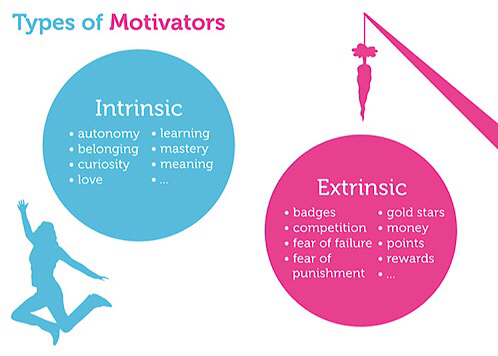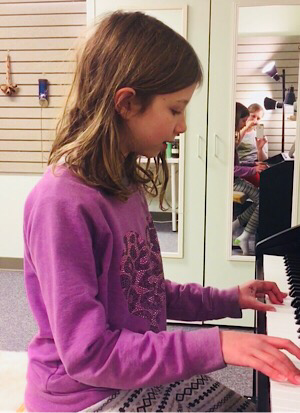|
“I’ve been struggling with practice lately...” I can’t tell you how many lessons begin with that sentence. Motivation to play throughout the week, or the lack thereof, is the problem I hear about most from current students. It makes sense! Consistent practice is easy for the first weeks of piano lessons. After all, you/your child has just signed up for piano lessons and your reason for doing so is still fresh on your mind! But what happens two months in when soccer practice kicks in four days per week? Or summer begins and you just want to be outside during your free time? Or you get sucked into that new show on Netflix? This is where conscious motivation (the antidote to the no-practice blues) comes in, and most students need support here. Internal vs. External MotivationThere are two main types of motivation: internal and external. As Tyler Tervooren explains on his site Riskology.com: When you’re externally motivated to make a change, the things that drive that change are outside of you and your control. If you’re trying to get in shape, it could be keeping your partner attracted to you, finding a mate, or impressing friends and colleagues. All the data say if these are the reasons you do what you do, it probably won’t last. External factors change, you can’t control them, and trying to keep up with them proves useless over time. But when you’re internally motivated, you’re driven by a desire to make yourself better. You’re only accountable to you, and that means you control the variables that decide whether you succeed or fail. When those factors are stacked in your favor, the odds say you’ll make lasting change. The lasting change we’re looking to create here is daily (or at least 4 days per week) piano playing, so let’s look at some specific ideas to encourage that behavior. Ways to Keep the Motivation FlowingHelping students stay motivated is a big part of my job as a piano teacher. I get to know each student and what drives them as soon as I can and plant seeds each week to keep that drive growing. But the actual piano lesson is such a tiny fraction of a student’s week that it’s important to have in-home support to continue that motivation. Here are my top 10 ideas for promoting both internal (I) and external (E) motivation for the piano student in your life: 1. Go to music performances as often as possible - especially piano-centric performances. (I) 2. Offer a weekly or monthly performance opportunity in your home. This can be as formal (dressing up, creating programs, maybe even inviting guests) or informal (PJs and popcorn) as the student prefers. (I/E) 3. Allow them to be the piano expert in your home as quickly as possible. Even if other members of the family have more piano experience, acknowledging the budding expert in a beginning player can go a long way toward helping them play long enough to be an actual expert. (I) 4. If you hear them singing/enjoying a new favorite song, encourage them to learn it on piano! Playing the music they love is the lifelong skill we’re trying to cultivate here - not frequently stepping out of their comfort zone and into new genres as we do during lessons. (I) 5. If you play piano, offer to play with the student in your home (while still supporting their budding expertise)! If they’d rather not play together, invite them to teach you a song or scale that they know and you don’t. The best way to learn - and notice your own expertise - is to teach. (I/E) 6. Encourage them to start an Instagram page for their music! YouTube is great too, but it’s more difficult to fine-tune the privacy settings and requires more parent-involvement for kid students. On Instagram, they can quickly build a following of 50+ friends and loved ones to play for and receive compliments from regularly. And instead of monitoring that selfie they posted all night, they’ll be monitoring their piano audience and planning their next piece to master and perform. (I/E) 7. Download GarageBand if there’s a family iPad or laptop and explore with the piano student in your home. GarageBand is remarkably intuitive and can compel many students to learn more about piano in order to compose what they’d like to compose. (I/E) 8. Help keep the piano area fresh, lovely and inviting: no mail piling up... or piles of anything! The more you orient this area toward the family pianist(s) by adding photos/art/plants that are meaningful to them, clearing lots of space for their books and binders and maybe even adding an additional space (basket or other container) for any additional piano gear they may use, the more time they’re likely to spend there! (I) 9. Encourage exploration of other instruments! This may seem counter-intuitive but more often than not, playing a new instrument increases one’s interest in their primary instrument. (I/E) 10. This is the one I’ve found to be most consistently helpful: focus on the skills they’re building (stronger and more agile hands, better memory, so many new connections in their brains, ability to read music...) more than individual pieces or performances. This is not an activity that one masters quickly and so noticing and validating little bits of growth as they occur can do wonders for internal motivation. (I) The Pay-Off & The Flip SideIt doesn’t take long to see the results of consistent practice. Students begin to notice new levels of mastery after just one week of consistent playing and progress is exponential from there. There will still be moments of plateaus in their learning process, but a regular playing habit lends a tremendous amount of resilience to those moments. On the flip side, when a student doesn’t play at home for more than one week in a row, a palpable sense of failure typically kicks in. And when that happens for a few weeks in a row, the student’s belief about piano begins to shift from a sense of budding mastery to a sense that they’re “just not good at piano.” The above scenario is probably the most painful part of my job. Piano is complex but developing skills you can be proud of is incredibly doable. No matter how skilled a player becomes while studying with me, I want them to leave lessons with the feeling that they can learn any instrument (nay, anything!) that interests them. A Master of Daily Practice is a Master of LearningAny adult reading this article is likely very aware of how tough it can be to start and maintain a new habit. But any of you who have pulled this off likely noticed some benefits you may not have been expecting... namely, the next habit you began was much easier to maintain!
Learning your own template for beginning and maintaining habits is priceless at any stage of life. It opens up doors for being able to make any change and learn any topic that interests you. No biggie, right? ;) (And witnessing the above is easily the most joyful part of my job and, honestly, my life.) So choose an idea from above or try out your own and run an experiment for two weeks to see if the piano student in your life is more drawn to daily playing. If not, try another. This is one skill that’s so helpful, it’s worth taking the time to crack the code. From one musician to another, <3 Sarah
0 Comments
Leave a Reply. |
Sarah CollinsPiano, voice and composition teacher in Portland, OR. Archives
October 2022
Categories |


 RSS Feed
RSS Feed